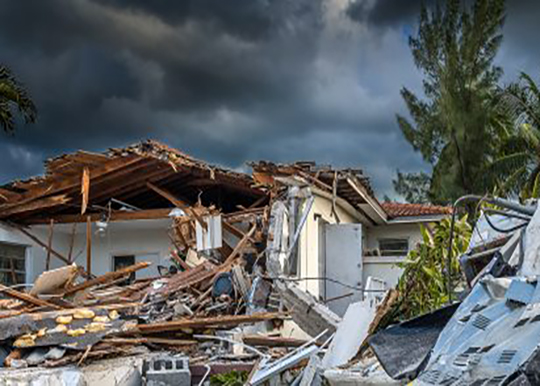How to Get Your Credit Disaster-Ready

Planning ahead not only positions you to recover; it also helps shore up your finances in general. Your effort will not be wasted.
Those most at risk
If your finances are already shaky, preparing is especially important.
Those most at risk for credit problems after a disaster are disproportionately young and people of color, says Caroline Ratcliffe, senior fellow at the Urban Institute, a Washington, D.C.-based think tank. “People who [were] struggling financially before this shock end up being those most harmed,” says Ratcliffe, who co-authored “Insult to Injury: Natural Disasters and Residents’ Financial Health.”
Her Urban Institute colleague Daniel Teles says a disaster can become financial quicksand. People who had low credit scores end up with fewer credit cards over time, he says, adding “we have heard anecdotally it can be harder to get a car loan.” That could mean being unable to replace a flood-damaged car, for instance.
Prep for disaster, help your credit
Some disaster preparations also benefit your credit, so getting ready is a win-win.
Check your credit
Get the free annual credit reports you’re entitled to and check them for score-lowering mistakes.
Keep a paper copy of the credit report section listing accounts and creditors’ contact information with emergency supplies. You might not have internet access or power, so having a hard copy is important.
Develop a safety net
Having an adequate emergency fund insulates you from financial shocks. But building one takes time.
A second-best solution is having quick access to credit. For that, you need “room” on your credit card or cards.
During and after a disaster
Be proactive about bills
Ask creditors for help, such as reduced minimum payments, suspended payments or a higher credit limit. Ask to get the agreement in writing.
Be strategic in paying bills; don’t pay a credit card in full if you might run out of money to cover another bill or next month’s payment. Paying only minimums makes sense when your cash flow is interrupted.
The most important thing is to avoid missing a payment because that affects your credit score for a long time. Paying only minimums also could reduce your score, but that damage can be short-lived. It disappears as soon as you’re able to bring the balances down.
Act quickly to get help
Seek any state or federal disaster aid you might qualify for because recovery may take longer or cost more than you estimate. The window to apply for aid may be small.
Teles says allowing shock or sadness to immobilize you can be costly. If your housing or employment is affected, he recommends looking for shelter and a way to earn money as quickly as possible.
Guard against fraud
Some offers of help are actually attempts to steal from you. If you receive an email or phone call purporting to be from a creditor, don’t respond directly; instead, use a number or email address you know is accurate, like the contact information on your saved credit reports or the creditor’s website.
Watch your credit during recovery
Check for “affected by a natural or declared disaster” codes on your reports. All three major credit-reporting bureaus — Equifax, Experian and TransUnion — have these codes. You can ask a creditor add it to your account, or the creditor may apply it proactively. FICO doesn’t consider the code in calculating your score, but its competitor VantageScore disregards negative information from accounts carrying that code.
Some consumers have reported downsides, however; for example, one Texas couple said they couldn’t qualify for a loan to buy their leased car in late 2017 because a disaster code added after Hurricane Harvey led lenders to believe it might possibly be flood-damaged. You can ask your lender, credit card issuer or the credit bureaus to remove the code.
Bev O’Shea is a writer at NerdWallet. Copyright 2019 NerdWallet, Inc. All Rights Reserved


